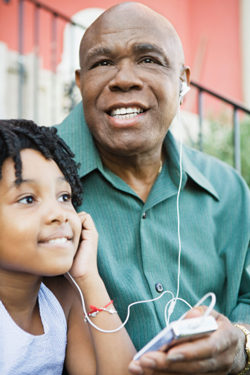 There's that song again. Hear it? Now remember what you were doing when you first heard it? You probably do.
There's that song again. Hear it? Now remember what you were doing when you first heard it? You probably do.
Sensory information, including hearing, is processed in the temporal lobe of the brain— the same region of the brain responsible for long-term memory. That's why hearing a song so often triggers a memory or an emotional response. In a sense, music helps a person to "code" memory and other sensory information.
A familiar refrain.
As we've discussed previously on this blog, many academic studies have shown music to be a powerful tool in improving brain fitness— especially for seniors who are struggling with new-onset dementia or who are recovering from neurological injuries and strokes.
National Institutes for Health (NIH) scientists, for example, have discovered a connection between the processing of auditory stimuli and increased activity in the area of the brain responsible for memory and emotion: the medial prefrontal cortex. Listening to music stimulates the one part of the temporal lobe, which in turn stimulates the adjacent medial prefrontal cortex.
According to Dr. Petr Janata, a neuroscientist at the University of California, Davis, the medial prefrontal cortex is typically one of the last parts of the brain that is affected as Alzheimer’s disease progresses— which may explain why some dementia patients can recall songs and memories from youth, even when they cannot normally converse or perform daily, routine tasks.
Listening to music "exercises" the area of the brain responsible for memory.
Some researchers believe that listening to music regularly can improve neurological integrity in the temporal lobe— just like lifting weights can shape and tone muscles and keep a person limber—and even recommend scheduled music therapy as a way of improving brain function.
In music therapy sessions, music is played for memory care patients during the course of normal conversation, in an effort to aid recall. There is some evidence that this can help the brain to fortify, or possibly even re-grow, connections between its various regions.
Researchers at Harvard Medical School, has found that making music can help stroke patients to overcome aphasia (the loss of the ability to speak) by stimulating undamaged sections of the brain that would otherwise not be responsible for speech to take over that action.
Music therapy can also help patients better tolerate chronic pain and can alleviate the symptoms of depression. A 2011 study at Drexel University, for example, found that music therapy reduced overall anxiety levels, lowered blood pressure and lowered reported pain levels in cancer patients.
That pain-alleviating effect was somewhat correlated in a 2012 study by the University of Utah’s Pain Research Center, in which participants were voluntary administered mild electric shocks to their fingertips. When soothing music was played in the background, participants reported experiencing less pain overall.
Music and wellness programs for seniors in Cincinnati.
There are many opportunities for older persons to explore their musical abilities, meet new people and improve their brain fitness levels right here in the Queen City.
The Cincinnati Music & Wellness Coalition is a cooperative effort between 30 different community organizations in the Tristate. It seeks to improve the quality of life and overall wellness for seniors, developmentally-disabled, brain-injured individuals and at-risk youth.
The Coalition conducts two, successful, evidence-based music and wellness programs.
One of these, Clavinova Connection, uses digital pianos to provide participants with "a unique series of music/wellness exercises that were created to harmonize mind, body, and spirit." The classes require no prior keyboard experience and are offered weekly at Bayley Place Retirement Community, Colerain Senior & Community Center and Anderson Senior Center. They are open to all ages.
The classes integrate music, movement and imagery to improve cognitive function and awareness. Participants might be asked to improvise, for example, their musical expression of happiness, sadness, or another emotion. The emphasis isn't on playing skill or compositional ability, so participants are free to explore in a non-judgmental, safe, creative atmosphere.
Creative Aging Cincinnati, a non-profit organization that exists to "provide arts and humanities programs that have a positive impact on the quality of life of older adults in the Greater Cincinnati Area," offers a listing of many music-listening programs and opportunities for seniors, including links to favorite local '40s-styled vocal duo the Sweet and Lows, performances by award-winning boogie woogie, jazz and blues pianist Ricky Nye, and to upcoming woodwind instrument demonstrations and lectures by former University of Cincinnati music professor Dr. Phil Crabtree.
Hearing and playing music is an excellent way for seniors to improve brain fitness.
It may help you to conserve your memory and cognitive function longer into your twilight years. Check out some of the great music listening opportunities and music wellness programs available in Cincinnati and give your ears— and your brain— the stimulus they need!












